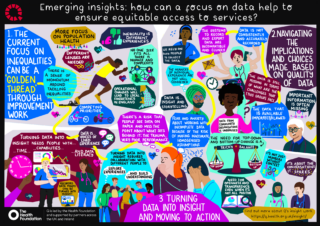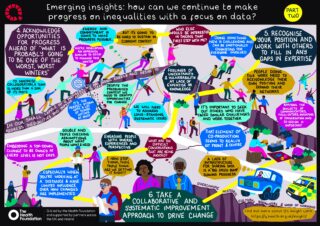With so many people waiting for care, timely and equitable access is a priority across the system. From what we’ve heard from the Q community and beyond, we believe that focusing on data can help us address inequalities, reduce backlogs and improve access to care.
Between June and October 2022, a Q community action learning project investigated the role of data. The project brought together Q members and others using data to improve access and address inequalities in their work across different health and care settings. They shared their challenges and experiences, supporting individual learning as well as generating wider insights.
We’ve pulled together the key insights in a report, Working with data to improve access and address inequalities: insights from the Q community.
Read the report (plain text version)
Read the report (single pages version)
The five themes for making progress
The report outlines themes to prioritise if we’re to make progress, alongside useful resources and tools:
- Acting with urgency but recognising the need for a longer-term focus. This includes being clear on the trade-offs between efficiency and equity and balancing immediate action with more deep-rooted change.
- Collecting and accessing better data on waiting lists and inequalities. This means drawing on national data where possible, but also investing in foundational data collection at a project level.
- Turning often imperfect data into action. The project highlighted the need to recognise the psychological toll and anxiety that working with imperfect data can cause. Also the time, capabilities, infrastructure and data literacy required to act on data.
- Recognising the benefits, and limitations, of applying a systematic improvement approach. Improvement can play an important role in defining priorities and problems, engaging staff, and co-producing with patients. But those working in quality improvement need to apply much greater focus to developing tools and methods that directly support equity and equality.
- Collaborating with and learning from others. We need to create spaces and processes where people working with data to improve access can share challenges and solutions.
About the project
We are very grateful to the participants on this project for sharing their experiences and expertise so openly and thoughtfully. Our thanks to Nicola Ballingall, Sarit Carlebach, Ellen Coughlan, Edmund Glynn, Daniel Hardy, Noshin Menzies, Clifford Mitchell, Eithne Mullen, Jillian Owens, Chris Pavlakis, Jo Phillips, and Mai Stafford.
Clifford, Noshin and Jillian were also kind enough to be interviewed about their experience on the project.
Video 1 (6 minutes): Introducing Noshin, Jillian and Clifford and why they joined the action learning project
Video 2 (4 minutes): What Noshin, Jillian and Clifford learned and how they will apply it
Video 3 (5 minutes): Some key insights about the use of data to improve access and address inequalities
Emerging insights
As well as our final report, we shared emerging insights during the project, which you can download below.

